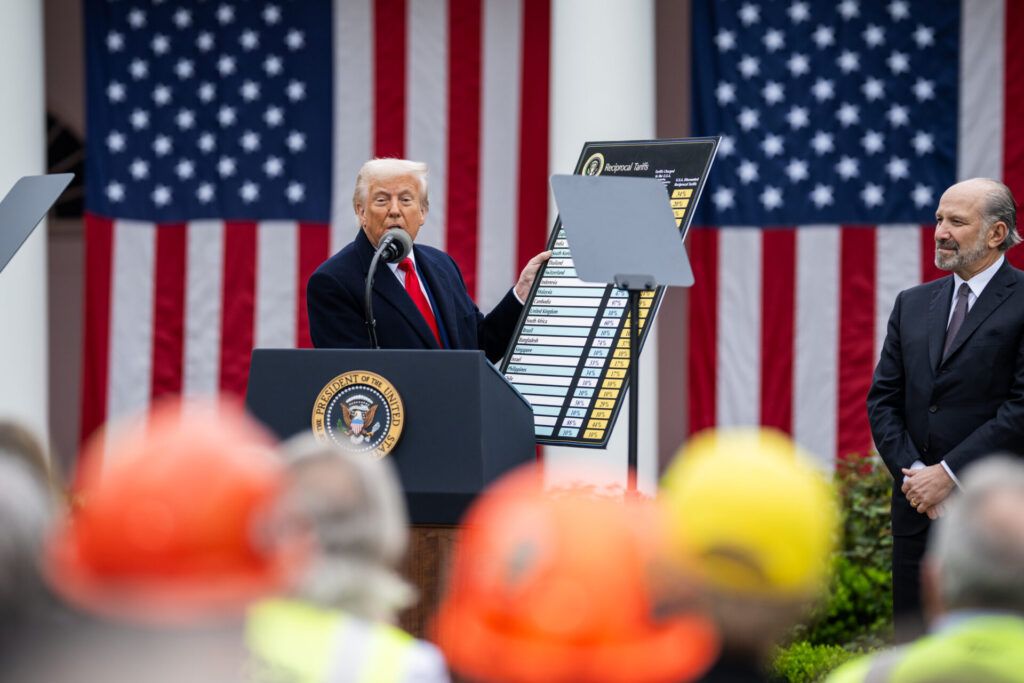At 100 days, what Trump’s new trade policy means for nonproliferation and international security
By Ian J. Stewart | May 9, 2025
 President Donald Trump signs an executive order on the Administration’s tariff plans at a “Make America Wealthy Again” event, Wednesday, April 2, 2025, in the White House Rose Garden. Image: The White House by Daniel Torok, Public domain, via Wikimedia Commons
President Donald Trump signs an executive order on the Administration’s tariff plans at a “Make America Wealthy Again” event, Wednesday, April 2, 2025, in the White House Rose Garden. Image: The White House by Daniel Torok, Public domain, via Wikimedia Commons
More than 100 days into his second term, President Trump’s international agenda is beginning to take shape. Domestically, he has focused on immigration and administrative efficiency, while internationally, the president is reshaping the conflict in Ukraine, European defense, the Middle East crisis, and trade tariffs. Of late, the tariff announcements—whose effects have impacted everything from the stock market to the US dollar—have grabbed much of the headlines. But what are the implications of the Trump administration’s trade policy for global security?
While the administration’s efforts to reshape global order are geared toward serving economic and strategic interests domestically, they must be balanced carefully with long-standing commitments to nonproliferation, defense cooperation, and international partnerships—especially in an era of renewed great-power competition. This is especially important since the world’s economic, nonproliferation, and global security interests are increasingly linked.
Presently, the United States has an abundance of international leverage (due to the Trump administration’s tariff policy) and a leader who has demonstrated his willingness to take on matters that may otherwise have been foregone. There is a myriad of interlinked issues that the current administration should seek to address in its trade negotiations in addition to tariffs, including supply chain vulnerability, European rearmament, strategic tradeoffs with China, defense exports, proliferation and extended deterrence, and AI governance. The United States should use its current economic strength and leadership position to secure a new compact—a non-binding set of principles on economic security, inclusive of export controls—with its allies on these key issues.
Competing priorities. The current administration seems to be prioritizing tariffs, particularly when dealing with allies, putting the issue ahead of other strategic concerns like arms sales or nuclear nonproliferation.
The objective of the tariffs policy is still ambiguous, but it appears the goal is to balance the trade deficit and spur investment and manufacturing in the United States. Beyond this, the new administration should use its economic leverage to pursue a broader swath of interests. Generally, in international affairs it’s common to separate issues to make progress in specific key areas. One main reason for this is that leaders can only provide so much leverage and attention—both limited resources. Nonetheless, the administration could focus on six key issues.
Supply chain vulnerability
More domestic manufacturing in certain sectors would reduce reliance on higher risk regions and thus support nuclear nonproliferation and international security interests. For instance, America is still too reliant on Taiwan to manufacture semiconductors and lacks indigenous nuclear supply chains. While the Biden administration focused on semiconductor supply chains through massive subsidies to semiconductor firms under its CHIPS and Science Act, it did little to address nuclear supply chain issues. Policymakers and experts actively debate the effectiveness of subsidies compared to other measures such as tariffs. But it is possible that tariffs could actually kickstart broader industrial development in the United States that would address some current supply chain dependencies.
The Trump administration should review key industries to ensure that incentives and disincentives promote American interests. A litmus test of this could be the nuclear sector, where there is a need to reestablish a US industrial base after decades of stagnation. To reinvigorate the nuclear sector at least on an interim basis, the United States would likely need to cooperate internationally, particularly with the Republic of Korea and Japan, which currently house much of the heavy forge capability—vital for nuclear reactor vessels and other power plant components—that exists outside of China. America might require similar international cooperation for other sectors like shipbuilding.
European rearmament
The administration should also examine how Europe navigates the complex issue of rearmament. The United States clearly welcomes increased defense spending and armament in Europe. At the same time, America balks at the prospect of the European countries diversifying from US defense suppliers. Ultimately, the United States depends on defense exports to subsidize its own defense industrial base. Reforming defense exports could help maintain America’s role as the dominant supplier. However, in practice, the United States is likely to have to cut a new deal with Europe that squares broader interests, including efforts to constrain Chinese economic influence and coercion globally, including in Europe.
China’s strategic tradeoffs
So far, the United States’ focus on tariffs has led to a new trade war and escalating tariff measures. But more traditional security challenges have dominated the US-China relationship in recent years. As the administration moves past its initial phase, it is likely to increasingly focus on addressing such challenges, including through an increased military presence in the region, the deployment of novel weapons systems capable of countering China, and ever-stricter technology and export controls.
Two key areas where competing interests clash are missile proliferation and export control implementation. The Trump administration is reevaluating the long-standing Missile Technology Control Regime (“an informal political understanding among states that seek to limit the proliferation of missiles and missile technology”) commitments which, among other things, could open the door to new transfer arrangements with key allies in the region. Such a move could help counter China. At the same time, it remains in the United States’ interest to discourage missile proliferation and transfers in other regions.
The main challenge with export controls is that for US measures to work, European and Asian allies need to implement comparable policies. On one level, it may be more difficult to convince such allies to go along with US measures when bilateral relations are dominated by tariff negotiations and concerns about American security guarantees. On another level, China continues to pose a challenge to European and Asian allies just as it does to the United States.
Defense exports
The Trump administration is rightly focused on maximizing US defense exports and moving to reform the Foreign Military Sales process, in which the United States sells defense equipment, services, and training to foreign governments, and review export controls. The reform will presumably ease transfers to countries that align with America’s view of China. This, for example, could include F35 sales to India and missile and unmanned aerial vehicle sales to many countries. Even if the Trump administration doesn’t prioritize international export control forums like the Missile Technology Control Regime, there is still reason to sustain these programs where such cooperation makes sense.
Nuclear proliferation and extended deterrence
The American desire for international partners to shoulder more of the security burden is driving those allies to seek their own nuclear weapons. Although Poland is the most vocal in expressing this desire, a list of other countries—including South Korea, Japan, Germany, Ukraine, and potentially Saudi Arabia—fall in this category. The United States has historically favored minimizing the number of nations that possess nuclear weapons and has been willing to bear the cost of extended deterrence to ensure this. If the second Trump administration decides not to bear this cost, it will have to decide whether it is implicitly or explicitly permitting additional nuclear decision-making centers or whether it will attempt to prevent such proliferation even while withdrawing the American security guarantee.
AI governance
If AI optimists are to be believed, the second Trump term could see the birth of artificial general intelligence, a technology that would rival human intelligence and likely alter society in extraordinary ways. The United States’ position on global regulation of artificial intelligence is therefore of vital importance. So far, the Trump administration seems to favor a free market approach to AI regulation, except as it relates to China, where the administration appears to be redoubling efforts to constrain their progress, including efforts to restrict China’s compute capacity.
The Trump administration must rapidly come to a conclusion about its broader policy, however, not least as the AI Diffusion Framework enacted in the final week of the Biden administration will come into effect soon. That framework limits how much compute capacity was allowed in countries worldwide and thus went against free market principles. Industry groups pushed back heavily. Still, the overarching purpose of the framework was ultimately to constrain China’s access to cutting edge AI infrastructure—a goal that is likely shared by the Trump administration. The current government should thus leverage the opportunity afforded by tariff negotiations and by its review of the AI diffusion Framework to reach broader understandings with foreign countries regarding the governance of compute capacity.
Threading the needle. While economic interests in the context of the “America First” agenda are likely to be the paramount driver, the administration will have to balance its trade agenda with its other priorities, including nonproliferation and international security. It is after all not in American interest for many more countries to have nuclear weapons, for countries to diversify from US defense exporters, for the global technology sector to shift away from the United States, or for allied nations to reverse commitments to constrain Chinese access to advanced technology for military and strategic purposes.
The current administration has substantial leverage to address these points in bilateral negotiation, particularly given the interests of key partners in retaining support of the United States. Their primary challenge, however, will be pace: Negotiating with more than 70 countries on tariffs will consume key officials in the near-term. To keep pace, officials will likely need to keep the scope of negotiations narrow.
One way for the United States to square the circle would be to establish a new economic security compact—setting out expectations for partners in terms of major policy areas including those outlined above. This could include commitments on open trade and defense procurement with the United States, strengthened nonproliferation obligations, and measures to enhance the partner’s economic security in relation to China. The administration could strengthen adherence to the compact by tying it into trade negotiations, offering better terms to countries that more closely align to American policy interests.
The Trump administration will also have to work through how to reshape many specific sectors, including the semiconductor and nuclear industries. In some cases, the United States will need to work closely with foreign partners to bridge a shorter-term capability gap while seeking to reshore key industrial sectors.
As the administration advances its “America First” agenda, finding a new balance with key partners—particularly in nonproliferation and strategic technology governance—will be essential.
Together, we make the world safer.
The Bulletin elevates expert voices above the noise. But as an independent nonprofit organization, our operations depend on the support of readers like you. Help us continue to deliver quality journalism that holds leaders accountable. Your support of our work at any level is important. In return, we promise our coverage will be understandable, influential, vigilant, solution-oriented, and fair-minded. Together we can make a difference.
Keywords: AI, China, defense exports, nuclear policy, proliferation, tariffs, trade policy
Topics: Disruptive Technologies















